Deciding to go for a safari in Africa is one of the best decisions one can make in their lifetime. Africa is special and different. You can be sure to have a great time observing unique tourism features including hills, towering mountains, thick jungles, different plant species, beautiful oceans, lakes, rivers and swamps. Africa is known for having more wildlife species than any other continent in earth but there is more to experience including friendly and welcoming people. It is also important to point out that the African economy is the fastest growing after Asia. An African safari allows you to see the changes occurring in the continent.
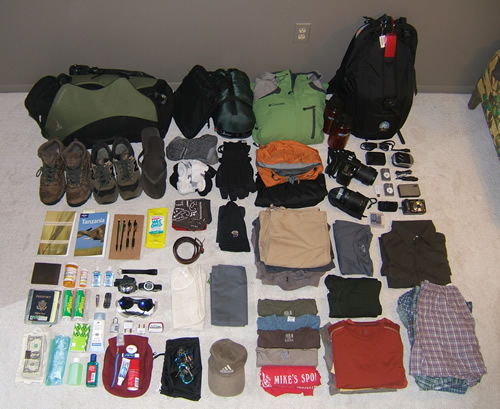 After making the decision to travel to African, deciding where to see wildlife, the best to visit and perhaps completing the bookings, one will at some point begin trying to figure out what they need to pack in order to ensure that they have the best possible experience. Travelers may end up to not packing the right items or pack more than enough leading to the rejection of some of their luggage for excess weight. We recommend that a Traveler packs only the essential things and that are within the standard airline weight requirements. This article will list and discuss all the important things to consider packing for your safari in Africa. You might want to read about what to pack while on a Uganda safari. There are also related articles on the packing list for a Rwanda safari and what to pack for gorilla trekking.
After making the decision to travel to African, deciding where to see wildlife, the best to visit and perhaps completing the bookings, one will at some point begin trying to figure out what they need to pack in order to ensure that they have the best possible experience. Travelers may end up to not packing the right items or pack more than enough leading to the rejection of some of their luggage for excess weight. We recommend that a Traveler packs only the essential things and that are within the standard airline weight requirements. This article will list and discuss all the important things to consider packing for your safari in Africa. You might want to read about what to pack while on a Uganda safari. There are also related articles on the packing list for a Rwanda safari and what to pack for gorilla trekking.
Packing List for a Safari in Africa
When about to go on a safari, you will want to consider packing the following items to have the most memorable and comfortable experiences. Some of the items we will be discussing may be so essential that traveling without them could mean delays at the airport or being stopped from entering a particular country altogether.
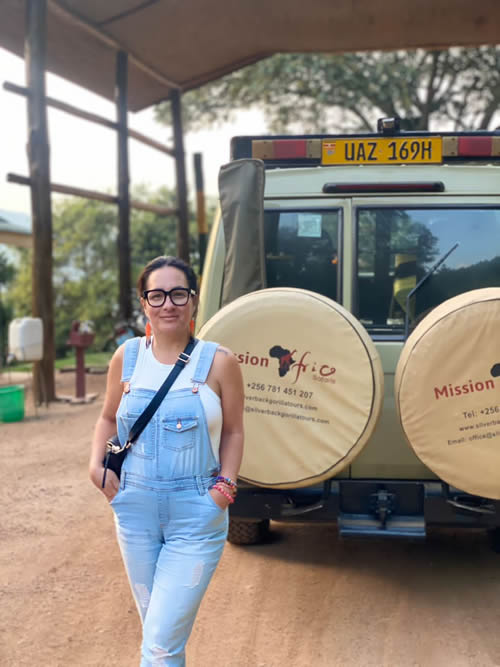 Travel Documents: Travelers should make sure that they have all their travel documents while on an African safari. These include passports/visas, air tickets, travel vouchers and any mandatory vaccination certificates. It is important to check the vaccination requirements of the country you hope to visit so as to be well prepared. The common diseases that may require vaccination certificates include yellow fever, hepatitis, meningitis and typhoid among others. Essential travel documents should be carried with you at all times. Avoid placing them in your main luggage as they could get lost resulting in missing luggage. Make sure that these important documents are kept safe with you at all times or left with the Hotel Manager whenever you are out on a particular activity.
Travel Documents: Travelers should make sure that they have all their travel documents while on an African safari. These include passports/visas, air tickets, travel vouchers and any mandatory vaccination certificates. It is important to check the vaccination requirements of the country you hope to visit so as to be well prepared. The common diseases that may require vaccination certificates include yellow fever, hepatitis, meningitis and typhoid among others. Essential travel documents should be carried with you at all times. Avoid placing them in your main luggage as they could get lost resulting in missing luggage. Make sure that these important documents are kept safe with you at all times or left with the Hotel Manager whenever you are out on a particular activity.
Enough Money: Travelers must travel with enough money or cash. They should also ensure that they have their Travelers cheques, bank cards or e-wallet apps which make accessing funds faster globally. Do not move around with a lot of cash on you because you could become a potential target for people with ill motives.
Travel Insurance: Tourists must make sure to have comprehensive travel insurance before setting off for their trip. This is very important in case of an emergency like sickness, accident and an urgent need for medical evacuation. Have your travel policy and contact details in case of any emergencies or claims. Just like the travel documents, your travel insurance documents must not be kept in your main luggage to avoid losing it.
Medications: Travelers with underlying health problems need to travel with their medications because getting them in some African countries may not be possible. Traveling with anti-malarial drugs is highly 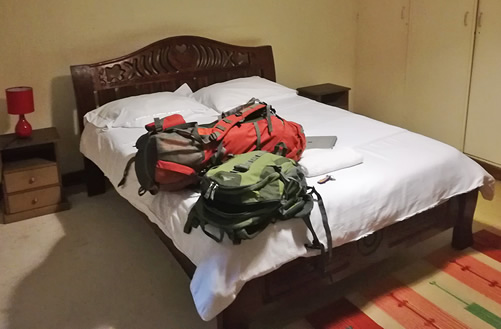 recommended since most parts of Africa still have mosquitoes. Ensure that you carry any medical prescriptions with you at all times to avoid losing it or having it destroyed in the checked luggage.
recommended since most parts of Africa still have mosquitoes. Ensure that you carry any medical prescriptions with you at all times to avoid losing it or having it destroyed in the checked luggage.
Communications Gadgets: Tourists must ensure that they travel communication gadgets like smart phones in order to keep in touch with their loved one’s back home. It’s also advisable that Travelers have with them important contact lists just in case of emergencies. The contact list is important in case you lose your phone.
The Clothing to Pack for a safari in Africa
When packing clothes, it’s important that you consider the weather and climatic conditions of the places you intend to visit. It’s also advisable that you pick out comfortable and durable clothing and footwear. Let’s discuss what to wear in more detail: –
Footwear: Tourists should consider packing comfortable and closed walking shoes that are ideal for nature walks in the jungles of some African countries or while on game drives. Travelers who intend to go for gorilla trekking or mountain hiking need to pack light and strong water-proof hiking boots. Every Traveler should have simple sandals to use while spending free time at tourist lodges or when swimming at the beach.
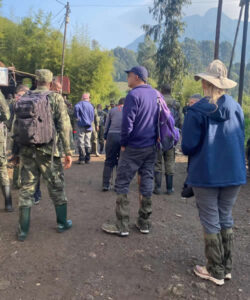 Clothes: Simplicity is paramount when planning on which clothes to pack for your African safari. Light clothes will make you comfortable and prevent sun burns. Long sleeved shirts will protect you against insect bites. Any Traveler will also need trousers, shorts, T-shirts and simple dresses. Consider neutral colors like beige, khaki, light blue or anything in that category. Black colored clothes wouldn’t be so ideal because they absorb heat and this would make things uncomfortable. Avoid clothes that look like those used in the military to avoid suspicion. Neon colors are attractive to light-loving insects. You don’t want insects following you around in the night. Don’t forget to pack swimming costumes because you will need them while exploring the African beaches or while at the swimming pool. A Simple hat will help protect you from the sun during those long game drives.
Clothes: Simplicity is paramount when planning on which clothes to pack for your African safari. Light clothes will make you comfortable and prevent sun burns. Long sleeved shirts will protect you against insect bites. Any Traveler will also need trousers, shorts, T-shirts and simple dresses. Consider neutral colors like beige, khaki, light blue or anything in that category. Black colored clothes wouldn’t be so ideal because they absorb heat and this would make things uncomfortable. Avoid clothes that look like those used in the military to avoid suspicion. Neon colors are attractive to light-loving insects. You don’t want insects following you around in the night. Don’t forget to pack swimming costumes because you will need them while exploring the African beaches or while at the swimming pool. A Simple hat will help protect you from the sun during those long game drives.
Jackets: Everyone visiting Africa for a safari should consider packing some light sweaters/jackets for the cold mornings and evenings. If you intend to visit during the wet seasons, packing heavy jackets, rain coats and warm hats will be of great help. A raincoat should always be in your hand bag because weather can be unpredictable with the current global warming. Always remember that countries that lie in deserts are hot during the day but very cold during the night. Plan accordingly.
Other important items to pack for a Trip to Africa.
Skin Protection: These include Eco-friendly insect repellent creams/sprays to help prevent mosquitoes and other vectors during your nature walks in the wild. Sunscreen is very important on hot days while anti-septro creams can help deal with minor scratches or insect bites got while out in the wild. To protect your lips and ensure that they are moist even on a hot day, travel with lip balms.
Binoculars: Every Traveler planning on an African safari must acquire a pair of binoculars. Binoculars are help with observing things from a distance. It is common to see families or friends with one pair of 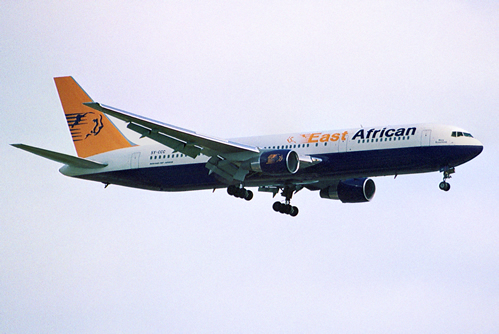 binoculars. This is not recommended because it becomes inconveniencing to see Travelers scrambling for a pair of binoculars. Whenever possible, the binoculars should have night vision capabilities to give you great views during those night game drives.
binoculars. This is not recommended because it becomes inconveniencing to see Travelers scrambling for a pair of binoculars. Whenever possible, the binoculars should have night vision capabilities to give you great views during those night game drives.
Communication Gadgets: Travelers need to travel with their earplugs, headphones, audio books and iPads to help keep them entertained or engaged during transfers or when resting after activities. Additionally, charging devices like plugs, adapters and power banks are important for keeping the gadgets/devices operational at all times.
Backpack: Travelers need to ensure that they have a light backpack or bag to carry along during their African safari. A backpack is ideal for carrying travel equipment, snacks, drinks, copies of travel documents, pieces of souvenir and more. While going out for demanding activities like mountain hiking and gorilla trekking, one can always hire potters to help with carrying any bags. Porters can be found at park offices or the starting point of a particular activity.
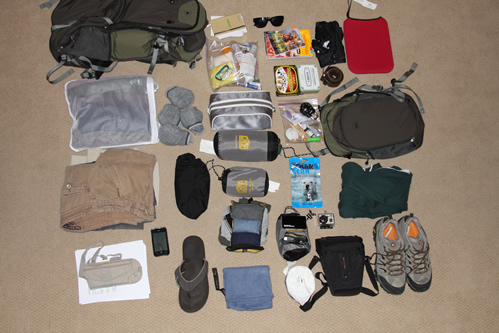 Cameras: A safari in Africa requires a good quality digital camera with extra memory space with support for SD cards. You cannot travel to Africa without a camera to record all the special moments during your trip. How will you make videos of your trip to be shared with your online followers on YouTube, Instagram, Facebook or Tiktok?
Cameras: A safari in Africa requires a good quality digital camera with extra memory space with support for SD cards. You cannot travel to Africa without a camera to record all the special moments during your trip. How will you make videos of your trip to be shared with your online followers on YouTube, Instagram, Facebook or Tiktok?
Maps, GPS and Compass: Travelers may need to install GPS apps on their smart phones to help them identify points of interest such as markets, restaurants and recreation facilities. A GPS app is very essential for Travelers who are driving themselves in a foreign country. A GPS app will help them locate their hotels or sites where particular activities are arranged.
In conclusion, anyone planning to go on an African safari must prepare in advance and ensure that they travel with all the important items required to have the best possible experience. Whereas we have listed many things to consider packing, one should avoid over packing. They should consider the most essential items that really matter. It’s important to avoid traveling with very expensive jewelry. One should also avoid packing all your items in one main luggage to avoid losing everything.

